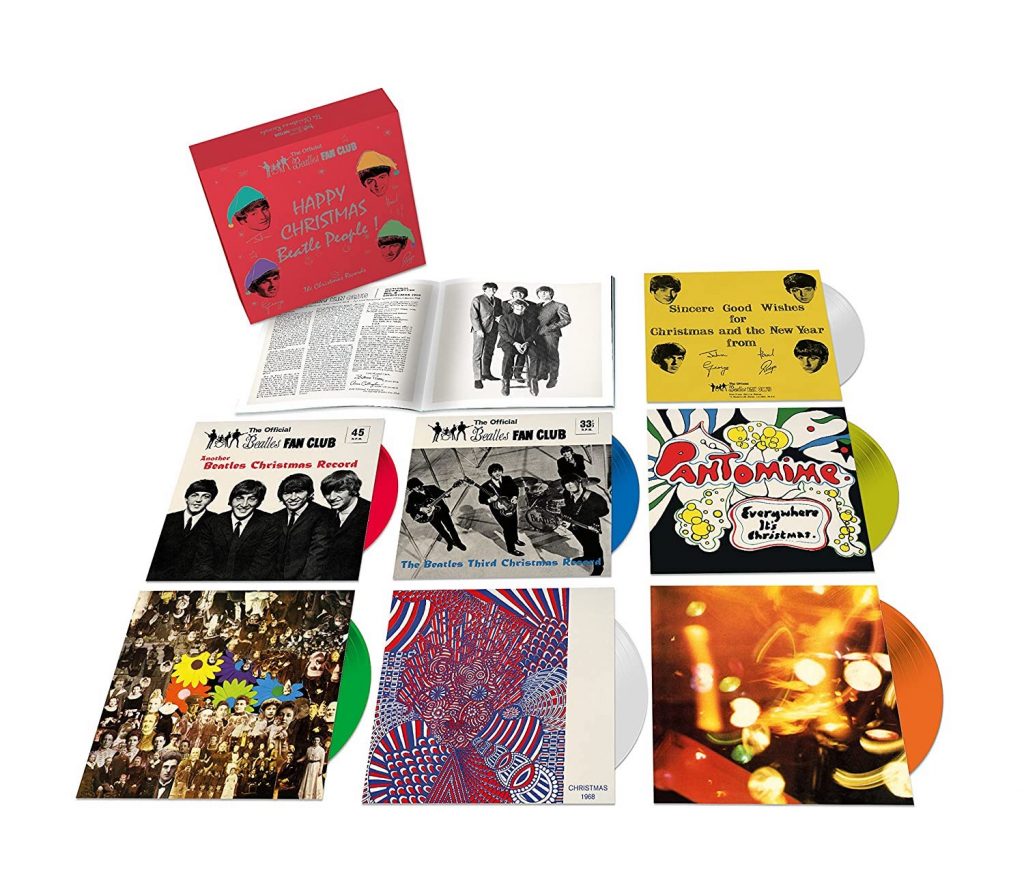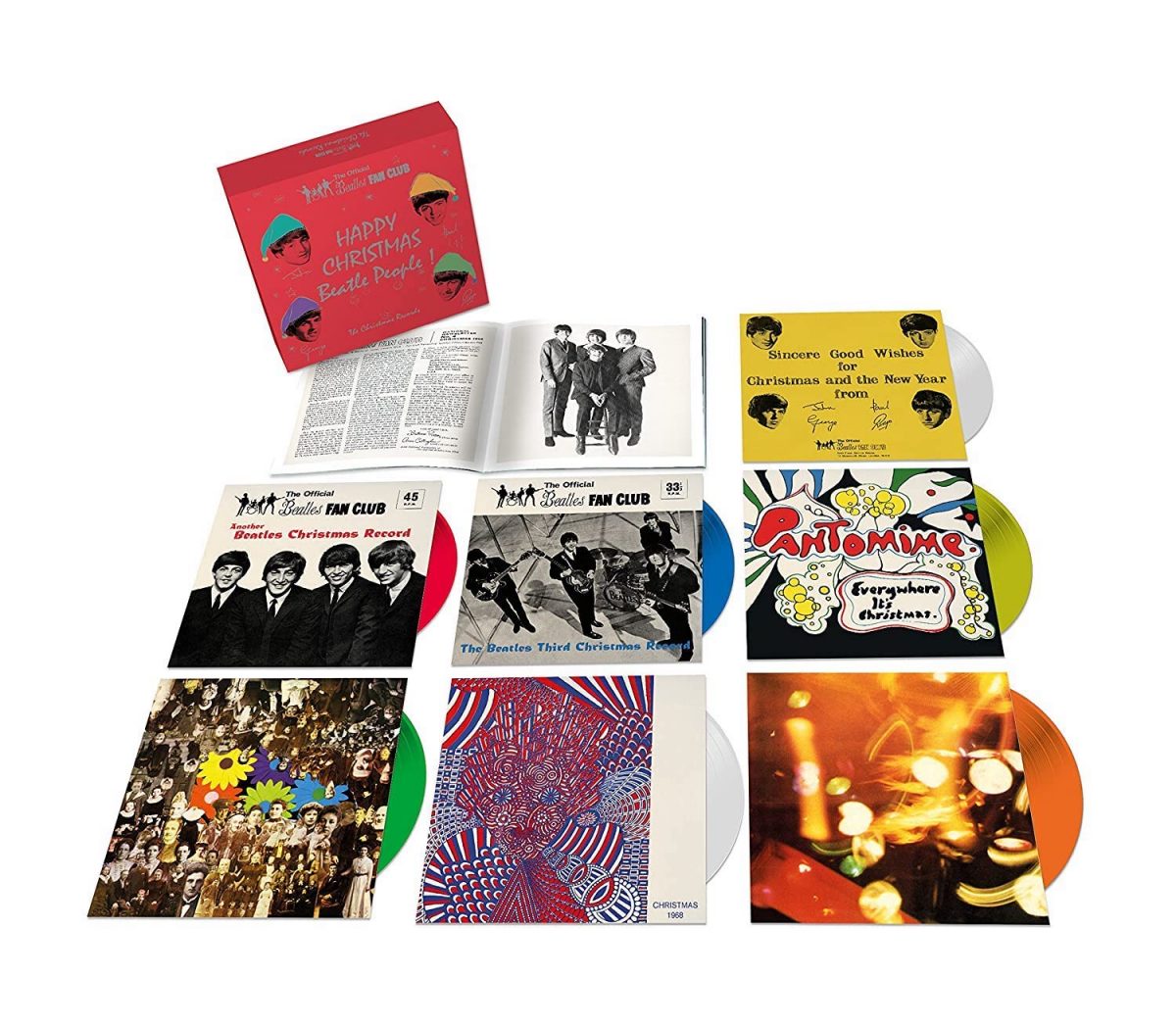
Considering I’m writing this on the 37th anniversary of John Lennon’s death without realizing that it was the assassination’s destiny date until the middle of my day makes me sad. Makes me think that there’s now a distance between all that the Beatles meant to me in my youth (British-ness, rebellion, silliness, harmony, jangle, bangs) and who they are to me now: Paul McCartney and Ringo Starr endlessly touring the oldies, happily playing the hits. That’s not wrong, but it’s not entirely right.
What sets Beatles listeners on the right track, however, is one of the few remaining treasure troves that went unreleased for so long and now is available. The U.K. and U.S. fan-club Christmas recordings seemed long lost in legal red tape and a desire to remain within the Apple family circle. Until now, with the release The Christmas Records.
“The Beatles’ annual holiday tradition of recording jolly Christmas messages for fan club members was an important part of the band’s relationship with their most ardent supporters, affectionately referred to by them as Beatle People” is the official statement on the seemingly forever-buried series of holiday recordings that began in 1963 during the Great British rise of the Fab Four and ended in 1969 when the quartet did.
Pressed on colored flexi discs and sent out solely to the membership of its fan club, these primarily comic singles—mostly spoken-word tracks lasting more than five minutes at a clip and sounding more like Monty Python sketches than Lennon/McCartney songs—never found their way into the mainstream like lost tracks on, say, the doggedly researched and lengthy Anthology project or the In Mono collection did. Written and produced by Liverpool pal Anthony F. J. “Tony” Barrow (until George Martin took over), the singles were primarily spoken-word works of downright silly, screechy fun and frolic. When the Beatles busted up, there was a very limited-to-fan-club-only full album compiled for the 1970 Christmas season, and that was all she wrote.
The Christmas Records, a limited-edition seven-inch boxed set (with its facsimile sleeves, which didn’t start looking great until the Beatles’ psychedelic years), came out on the same day as the Sgt. Pepper’s Lonely Hearts Club Band 180-gram LP and limited-edition picture-disc LP, and one week after PBS premiered Ron Howard’s documentary The Beatles: Eight Days A Week—The Touring Years. If anything details the triumphs of youth (over having to live in seedy Hamburg before that) and the decay of boredom and distaste for adulthood—let alone all of the band members’ personalities and sounds—it is The Christmas Records. Like the four mop-top lads living in one large flat in the movie Help!, the Beatles are a goofball musical brotherhood on the first three singles. They romp about making high-pitched funny voices, mock-sing “Good King Wenceslas,” tease Starr with “Rudolph The Red-Nosed Ringo,” perform some truly off-key versions of “Yesterday” and Lennon’s “Happy Christmas To Ya List’nas,” as well as use the now-famous phrase, “A merry grew year. Crimble maybe.”
By the time we get to the 1966 single, the Beatles themselves are the writers of their scripts, and Martin has taken over the sound board. The result: Recorded between sessions for Strawberry Fields Forever, the 1966 offering uses original songs such as “Everywhere It’s Christmas,” “Orowainya” and “Please Don’t Bring Your Banjo Back,” in-between several theatrical holiday skits. The 1967 single is even richer in story and sound as the Beatles pretend to be one of several new groups auditioning for the BBC holiday show, do impersonations and read poems such as “When Christmas Time Is Over.”
After this, you can feel the tension within the troupe as the 1968 single (produced by comic Kenny Evertt, no less) is the first (of two) where each Beatle records his holiday message separate from the others, with Lennon working with and referring to Yoko Ono on prose pieces such as “Jock And Yono,” with McCartney’s “Happy Christmas, Happy New Year” as a musical highlight. By 1969, Christmas cheer felt more like a eulogy—eggs without the nog—which is probably how the Beatles felt at that point, so close to the end.
With that, The Christmas Records is just like a family life’s well lived and sourly ended. Through the good times and bad, there are still Christmas songs and poems to be had, and maybe a few laughs, even if they’re not made together as one.
—A.D. Amorosi







